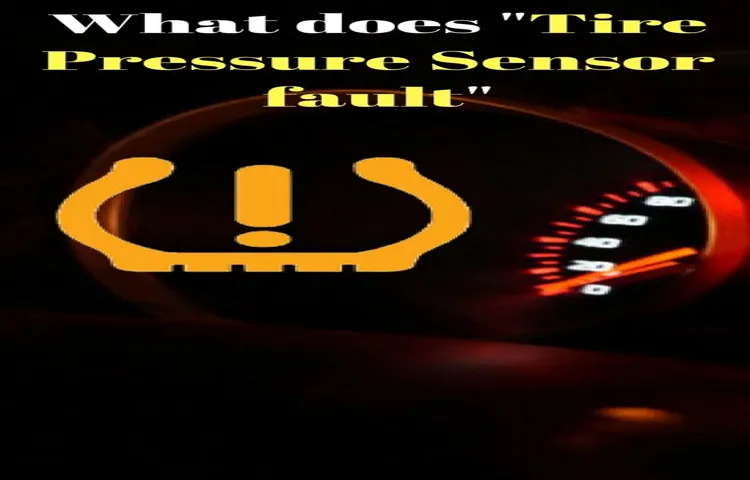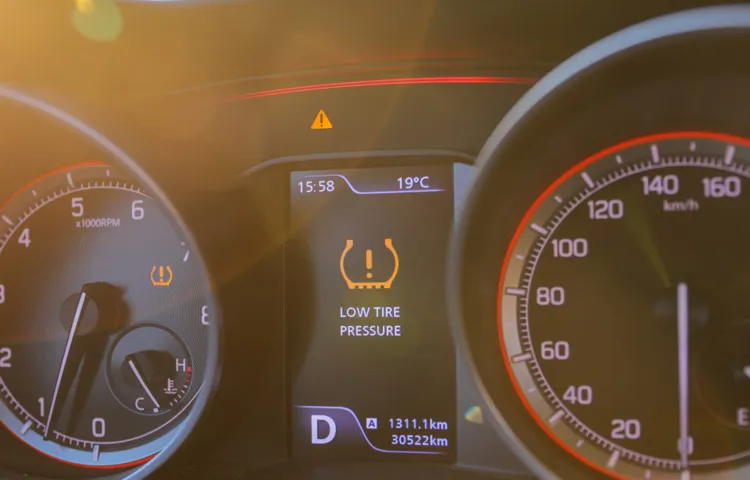Imagine this scenario: you’re driving down the road and suddenly your car tire pressure sensor light comes on. You’re probably wondering what this means and why it matters. Well, a car tire pressure sensor fault is a warning from your car’s onboard computer system that there’s a problem with one or more of your car’s tire pressure sensors.
This fault can occur for various reasons, most commonly due to a dead battery or sensor failure. When your car tire pressure sensor fault light illuminates, it’s essential to take it seriously. Ignoring this warning could cause damage to your tires or even cause an accident.
The tire pressure sensor is responsible for measuring the air pressure inside your tires, ensuring they’re inflated to the correct PSI. If the tire pressure is too low, it can affect your car’s handling, performance, and fuel efficiency. To avoid being left stranded on the side of the road or risking your safety, it’s crucial to check your tires’ pressure as soon as possible.
You can either use an air pressure gauge or take it to a mechanic for professional help. Fixing a tire pressure sensor fault can be quite simple, such as replacing the battery in the sensor, or it could require sensor replacement altogether. In conclusion, a car tire pressure sensor fault is something you shouldn’t overlook.
It’s a warning that indicates there’s something wrong with your vehicle that needs immediate attention. By understanding the warning and taking the necessary steps, you can ensure your vehicle’s safety and performance.
Table of Contents
Introduction
If you’ve seen a notification on your dashboard that says “tire pressure sensor fault”, you may be wondering what it means. Essentially, this notification is telling you that there’s an issue with the tire pressure monitoring system in your car. This system is designed to alert you if any of your tires are over or underinflated, which can affect your safety and the performance of your car.
When this system detects a fault, it can be caused by a number of different things, including a broken sensor, a problem with the wiring, or even a low battery. If you receive this notification, it’s important to have your vehicle inspected and serviced by a professional to ensure that your tire pressure monitoring system is functioning correctly. By addressing any issues early on, you can avoid potential safety hazards and keep your vehicle running smoothly.
Explanation of Car Tire Pressure Sensor
Car Tire Pressure Sensor Introduction: Have you ever experienced a flat tire while driving on the highway or going on a long road trip? It can be a frustrating and dangerous situation to be in. That’s where car tire pressure sensors come into play. Essentially, tire pressure sensors monitor the air pressure inside your car’s tires and notify you when it reaches a level that could potentially cause a flat tire.
These sensors have become mandatory in many countries, including the US, due to their ability to improve road safety and reduce the number of car accidents. In this blog post, we will explore the functions of car tire pressure sensors in greater detail to help you understand how they keep you safe on the road.

Causes of Tire Pressure Sensor Faults
Tire pressure sensors are essential components of modern cars that help drivers keep track of their tire pressure levels. However, these sensors can sometimes malfunction, leading to inaccurate readings and potentially, unsafe driving conditions. There are various causes of tire pressure sensor faults, including low battery voltage, sensor damage, and even electromagnetic interference.
In some cases, it could be due to a faulty sensor unit itself or an issue with the vehicle’s TPMS module. Regular maintenance and inspection of the TPMS system can ensure that these issues are caught and addressed promptly. By taking proactive measures to ensure the proper functioning of the tire pressure sensors, drivers can prevent significant tire damage or accidents on the road.
Symptoms of Car Tire Pressure Sensor Faults
If you’re driving along and suddenly see a “tire pressure sensor fault” message, it means that one or more of your tire pressure sensors may be malfunctioning. Symptoms can vary, but the most common is a warning light illuminating on your vehicle’s dashboard. Other signs of a faulty sensor may include incorrect readings of tire pressure, weird sounds coming from your wheels, or simply an inability to read your tires’ pressure at all.
It is important to address these issues quickly, as incorrect tire pressure can lead to decreased fuel efficiency, uneven tire wear, and even dangerous blowouts on the road. If you suspect that your tire pressure sensors are not functioning properly, it is best to bring your vehicle to a qualified mechanic for inspection and possible replacement of the faulty sensor.
Dashboard Warning Light
If you’ve ever experienced a warning light on your car dashboard, you know it’s not a pleasant feeling. One of the most common warning lights to come on is the tire pressure monitoring system or TPMS light. This light typically looks like a cross-section of a tire with an exclamation point in the middle and indicates that one or more of your tires has low pressure.
Ignoring this warning can lead to poor fuel efficiency, tire damage, and even accidents. But what happens if the light stays on even after adding air to your tires? It could be a sign of a faulty tire pressure sensor. These sensors, located inside each tire, monitor the air pressure and transmit data to the TPMS system.
A malfunctioning sensor can send incorrect readings, causing the warning light to come on and stay on. If you suspect a faulty tire pressure sensor, it’s best to have it checked by a professional mechanic. They can diagnose the issue and replace the faulty sensor to ensure your TPMS is functioning correctly.
By doing so, you’ll have peace of mind knowing your tires are properly inflated, and your car is safe to drive.
Reduced Fuel Economy and Increased Tire Wear
Car Tire Pressure Sensor Faults The tire pressure sensor in your car plays a crucial role in ensuring your vehicle operates smoothly and safely. When the sensor malfunctions, several problems can arise, such as reduced fuel economy and increased tire wear. You may also notice that your car’s handling feels different or the steering wheel vibrates excessively.
These symptoms can be frustrating and dangerous, but they also serve as clear indications that your tire pressure sensor needs attention. Ignoring the warning signs can lead to more significant problems down the road, including blowouts and accidents. Regularly checking your tire pressure and having your sensor inspected by a professional can prevent these issues from occurring, ensuring your car runs smoothly and safely for years to come.
Handling and Braking Issues
As a driver, you may have experienced the dreaded tire pressure warning light popping up on your dashboard unexpectedly, signaling that there might be a problem with one or more of your car’s tire pressure sensors. These sensors are installed in each wheel, and they are designed to detect and report the tire’s pressure levels to the car’s computer system, which then alerts you through the warning light. When these sensors malfunction, they can cause a variety of issues, including poor handling and braking response, decreased fuel efficiency, and even jeopardizing your overall safety on the road.
To prevent these unpleasant effects, it is essential always to keep an eye on your tire pressure and have your sensors checked by a professional mechanic regularly. Don’t ignore the warning signs and ensure your car’s tire pressure sensors are in tip-top shape to ensure a smooth and safe driving experience.
How to Fix Car Tire Pressure Sensor Faults
Have you ever had your car give you a warning that reads “tire pressure sensor fault”? Well, this can be an annoying issue to deal with, as it can even lead to inaccurate readings of your tire pressure. However, you can solve this by checking the tire pressure sensor battery and ensuring that it’s not dead or low on charge. If the battery is fine, then it might be time to replace your tire pressure sensor or have it repaired by a professional mechanic.
Replacing the sensor might seem like a daunting task, but it’s important to remember that it’s a vital component of your car safety, as it helps to warn you of issues with your tire pressure, which can ultimately help you avoid accidents on the road. So, if your car is showing tire pressure sensor fault, don’t hesitate to seek help as soon as possible and get it fixed for your safety and convenience.
Check the Tire Pressure
One common cause of a faulty tire pressure sensor is incorrect tire pressure. It’s crucial to check your tire pressure regularly to avoid this issue. Underinflated tires can cause the sensor to give inaccurate readings or stop working entirely.
Overinflated tires can also cause issues – it can trigger the sensor, leading to an unnecessary warning light. The recommended tire pressure for your vehicle can typically be found in your car manual or on a sticker inside the driver’s side door. Using a tire pressure gauge, check the pressure in each tire and adjust accordingly.
Remember to check your tire pressure when the tires are cool, as driving even a short distance can increase the pressure in the tires and give an inaccurate reading. Keeping your tires appropriately inflated not only ensures the accuracy of your tire pressure sensor, but it can also improve gas mileage and extend the life of your tires.
Check the Sensor Battery
Car Tire Pressure Sensor If you’re experiencing issues with your car tire pressure sensor, the first thing to check is the sensor battery. A low battery can cause the sensor to malfunction and give inaccurate readings. Most sensors come with a replaceable battery, which you can easily replace yourself.
Consult your car’s manual or look up online for the type of battery your sensor requires. Once you have the correct battery, follow the instructions in the manual to replace it. However, if the battery isn’t the issue, you may need to have your sensor checked by a professional mechanic.
Don’t ignore the warning signs, as driving with a faulty tire pressure sensor can be dangerous and could cause unnecessary wear on your tires. Keeping an eye on your sensor and replacing the battery will help ensure your car is running smoothly and safely.
Inspect the Sensors and Wiring
Car tire pressure sensors are a crucial component of modern vehicles, as they provide important feedback about the tire pressure levels to the driver. However, when these sensors fail, it can be a frustrating experience. One of the most common reasons for tire pressure sensor faults is faulty sensors or wiring.
In order to fix this, it is important to inspect both the sensors and wiring. Start by checking the sensors, which are typically located inside the wheel well. Look for any visible damage or corrosion on the sensors, as this can affect their functionality.
Next, examine the wiring leading to the sensors. Check for any cuts or breaks in the wiring, as well as any loose connections. If you find any issues, it may be necessary to replace the faulty components.
By inspecting the sensors and wiring, you can address one of the primary causes of tire pressure sensor faults and ensure your vehicle is functioning properly.
Conclusion
In short, when your car alerts you of a tire pressure sensor fault, it’s basically telling you to give your tires some love and attention. You may need to check the air pressure, replace a sensor, or even get some new tires altogether. So, take heed of your car’s warning and show your tires some TLC before they hold a grudge against you for neglecting them.
“
FAQs
What is a tire pressure sensor fault?
A tire pressure sensor fault is an indication that the tire pressure monitoring system (TPMS) has detected an issue with one or more of the tire pressure sensors in your car.
What causes a tire pressure sensor fault?
A tire pressure sensor fault can be caused by a number of factors, including a dead or low battery in the sensor, damage to the sensor, or interference from other signals.
How do I know if my car has a tire pressure sensor fault?
Your car’s dashboard may display a warning light or message indicating a tire pressure sensor fault if there is an issue with the TPMS.
Is it safe to drive with a tire pressure sensor fault?
While it may be safe to drive with a tire pressure sensor fault in the short term, it is important to have the issue addressed as soon as possible to ensure proper tire pressure and prevent potential safety hazards on the road.
Can I reset a tire pressure sensor fault on my own?
Depending on the make and model of your car, you may be able to reset a tire pressure sensor fault on your own by following the instructions in your owner’s manual. However, it is recommended to have a professional diagnose and address the issue to ensure proper function.
How much does it cost to fix a tire pressure sensor fault?
The cost to fix a tire pressure sensor fault can vary depending on the extent of the issue and the make and model of your car. It is best to consult with a professional mechanic or dealership for an estimate.
How can I prevent a tire pressure sensor fault from occurring?
Regularly check and maintain proper tire pressure in your car, avoid driving over curbs or other obstacles that can damage the sensors, and have your TPMS inspected during routine maintenance to prevent issues from arising.



